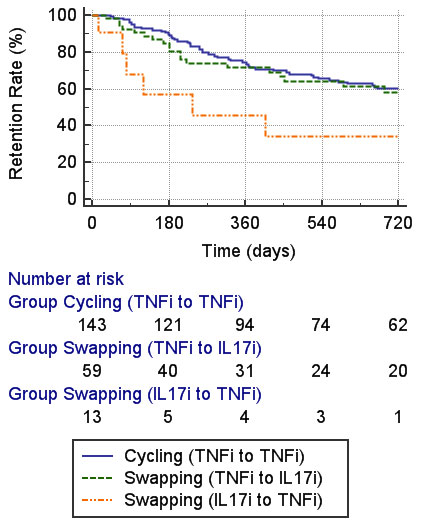Session Information
Session Type: Poster Session D
Session Time: 1:00PM-3:00PM
Background/Purpose: The therapy of psoriatic arthritis (PsA) was amplified in the last years with the introduction of a large amount of new biologic molecules with different mechanisms of action (MoA). In clinical practice, the most frequently prescribed biologics are interleukin-17 inhibitors (IL17i) and tumor necrosis factor-alpha inhibitors (TNFαi). There is an increased interest in the definition of the preferred therapeutic strategies after failure of the first biologic disease-modifying anti-rheumatic drugs (bDMARDs). In particular, if cycling (from TNFαi to another TNFαi) is better than swapping (from TNFαi to IL17i or vice-versa). The main purpose of this study is to identify whether these two different switching strategies (cycling vs swapping) better perform in terms of retention rate.
Methods: In this monocentric retrospective study, patients with PsA treated with TNFαi or IL17i were enrolled. The prescriptions were clustered as follows: cycling group (CG), swap group from TNFαi to IL17i (SG1), swap group from IL17i to TNFαi (SG2). The Kaplan-Meier method and Cox regression models were applied to describe and confront the drug survival rates, considering P< 0.05 statistically significant.
Results: A total of 176 patients were included in the study, 55.7% females and 44.3% males. The first line of therapy was TNFαi for the majority of patients (80.7%) while the others (16.5%) with IL17i as the first line of therapy. The 2-years retention rates of CG, SG1 and SG2 were respectively 60%, 58% and 34% (p=0.09) (Fig 1). The Cox analysis shows that SG1 strategy (from TNFαi to IL17i) is associated with an increased retention rate (Hazard Ratio 0.56; 95% Confidence Interval 0.35-0.89; p=0.02). In addition, other factors influencing the retention rate were: patient’s age (HR 0.987; CI 0.977-0.997; p=0.01), Disease Activity Index for Psoriatic Arthrititis (DAPSA) (HR 1.11; CI 1.09-1.12; p< 0.0001), concomitant steroid (HR 1.67; CI 1.21-2.30; p=0.002) and disease-modifying antirheumatic drugs (DMARDs) (HR 0.73; CI 0.55-0.97; p=0.03) and year of therapy prescription (HR 1.13; CI 1.09-1.19; p< 0.001).
Conclusion: These findings indicate that difference between swapping (from TNFαi to IL17i) and cycling strategy is not substantial in terms of the 2-years-retention rate. However, taking into account other risk factors (i. e. disease activity, concomitant DMARDs or steroid treatment, age and year of prescription) swapping from TNFαi to IL17i should be preferred since it is associated with a better retention rate.
To cite this abstract in AMA style:
Lumetti F, Ariani A, Coccolini C, Salvarani C, Sandri G. Cycling vs Swapping Strategies with TNFi and IL-17i in Psoriatic Arthritis: An Observational Retrospective Monocentric Study [abstract]. Arthritis Rheumatol. 2022; 74 (suppl 9). https://acrabstracts.org/abstract/cycling-vs-swapping-strategies-with-tnfi-and-il-17i-in-psoriatic-arthritis-an-observational-retrospective-monocentric-study/. Accessed .« Back to ACR Convergence 2022
ACR Meeting Abstracts - https://acrabstracts.org/abstract/cycling-vs-swapping-strategies-with-tnfi-and-il-17i-in-psoriatic-arthritis-an-observational-retrospective-monocentric-study/

